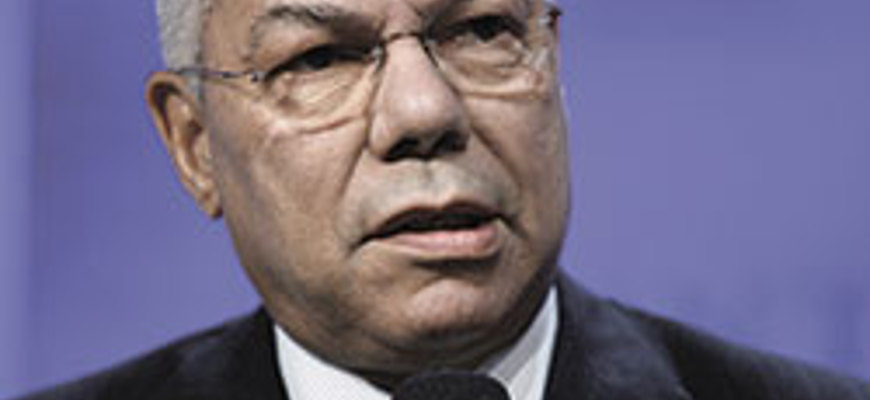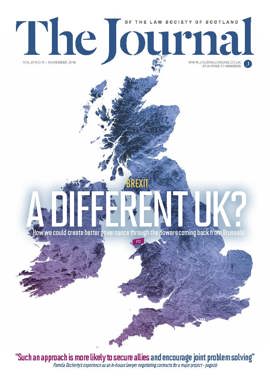Global players

With 6,000 lawyers from around the world gathered together at the International Bar Association annual conference, the formal deliberations – and informal chat – were not surprisingly as diverse and wide ranging as the jurisdictions and sectors they represented.
For the Scottish and broader UK delegation at the event in Washington DC, much discussion focused on the consequences of Brexit, while delegates from the host nation were preoccupied with the drama of the US presidential elections. The formal addresses and presentations featured similarly weighty international issues – for instance, General Colin Powell, the US Secretary of State under George Bush, giving his perspective on the Iraq War and Guantanamo, and Christine Lagarde, managing director of the International Monetary Fund, outlining some of the key challenges facing the international economy.
Aside from international politics, the purpose of the September conference was to scrutinise a huge range of legal issues, from the highly technical, such as a lengthy dissection of the international investment law implications of the Transatlantic Trade and Investment Partnership, to broad principles around the rule of law and human rights. The conference even explored the theatrical in legal practice – more of which later.
The world stage
The group representing Scotland – as part of the UK delegation led by Lord Keen of Elie, the Advocate General for Scotland, along with the Law Societies of England & Wales, and Northern Ireland – included the Law Society of Scotland’s President, Eilidh Wiseman, and chief executive, Lorna Jack, as well as leading solicitors from across the Scottish profession.
Lorna Jack says: “The scale of the conference is vast – 6,000 delegates who are a mix of individual members and those representing law societies and bar associations from around the world. Given this year’s host city, the programme of keynote speakers was quite US-orientated, though no less fascinating for that. However, the Scottish presence was also very strong, with a fantastic team of delegates. We were particularly proud of John Morgan, a newly qualified solicitor at Brodies who, in the face of competition from across Europe, received a scholarship from the IBA to attend the event.
“One obvious issue that came up was Brexit, and our message was that we are very much open for business, for instance as a seat of arbitration. We realise that, particularly as a smaller jurisdiction, we are going to have to reach out to the rest of the world – and that is precisely what we are doing.”
Eilidh Wiseman takes up the theme of “flying the flag for Scotland”: “The conference is a great opportunity to represent the Scottish profession to the world – particularly since the referendum vote to leave the European Union – but we also recognise the value of learning from others. While it is true that many legal systems face similar challenges, for instance around access to justice and the rule of law, it is also striking how differently lawyers behave in other jurisdictions.
“As just one example, in a session I took part in on ethics and professionalism, which involved some role play, it became clear that throwing a cup of coffee over a fellow lawyer in a court case might simply be considered courtroom theatre in the US, while that kind of behaviour would be totally inappropriate here. Safe to say, valuable lessons were learned.”
Sharing in the global market
Both the chairman of the Scottish Arbitration Centre, Brandon Malone, and its chief executive, Andrew Mackenzie, attended the conference. Malone expands on Jack’s point about the value of international connections, in stressing that the Scottish jurisdiction is open for business: “I have found the IBA conference especially useful in promoting the Scottish Arbitration Centre, and the Scottish jurisdiction, and we were able to draw on the goodwill and strong relationships that we have developed when pulling together our successful bid to host the International Council for Commercial Arbitration Congress in Edinburgh in 2020. We see this as an important milestone in the development of international commercial arbitration in Scotland.”
And this year, the IBA’s Access to Justice & Legal Aid Committee also focused on Scotland in reporting its survey on children and access to justice, as Mackenzie, an officer of the committee, notes. “The report on the survey frequently refers to Scotland, given the strong response from our jurisdiction. At our committee meeting, we agreed that over the course of the next year we will develop a survey and report access to justice for those with mental or physical disability; develop a report, based on a literature review, on the economic case for legal aid; and engage in a joint project on producing guidelines on the principles and practice that should underpin an effective legal aid system.”
Others among the Scottish delegation were keen to take advantage of the opportunities for networking and promoting business growth, particularly following the Brexit vote. Burness Paull partner Jamie Stark explains that, over the past three years, the firm has worked with clients in more than 60 jurisdictions, and international work now accounts for over 40% of business.
He adds: “The IBA’s annual conferences represent a fantastic blend of brainstorming on legal issues, networking and meeting contemporaries from other jurisdictions. Our ambition is to continue to grow our international practice and, for us, it is more than dots on a map where, in many cases, the dot is a serviced office or part-time presence. To us, being global means delivering deep resource and market intimacy. And it is the international network of connections that we have nurtured through the IBA and other associations over the last 20 or so years which has helped us to consolidate deep relationships in every jurisdiction that is important to our clients and important to Scotland.”
Christine O'Neill, partner and chairman at Brodies, agrees that the conference is valuable for making connections. “We see the IBA, and other similar events, as incredibly valuable opportunities to demonstrate our commitment to international collaboration and to make connections with like-minded firms. The quality of the workstream sessions is also excellent, with serious contributions made by heads of practice areas and panels drawn from leading firms, also underscoring the vital importance of the rule of law to economies around the world. Another aim is to continue to send the message to lawyers around the world that Scottish firms provide an equally high quality proposition for legal work across the UK and can operate as an effective base for European transactions.”
Sector interest
Equally, the conference provides important networking opportunities for those in specific sectors. Shona Frame, a partner at CMS, sits on the IBA’s International Construction Projects Committee, which allows her to meet other lawyers and professionals operating in the construction and infrastructure sector. She is encouraged that those from other jurisdictions are generally well informed about Scotland’s distinct legal system and, in the construction sector, on some of the key cases too.
Paul Hally, chairman of Shepherd & Wedderburn, says that this year’s conference provided an opportunity to discuss his firm’s expertise in energy and water projects and the potential for exporting this to other parts of the world, where they are beginning to tackle these issues. He adds: “The firm’s leading position in respect of renewable energy was widely recognised, and our expertise in projects and infrastructure also led us to identifying opportunities for possible collaboration with some of our best friends. With 6,000 lawyers attending, the conference was an efficient way to connect and reconnect in a short space of time with key contacts. The working sessions were excellent and highlighted the challenges to globalisation that national jurisdictions present and the advantage to be gained from being connected with experts in each jurisdiction.”
As a newly qualified employment lawyer, John Morgan, who was invited to attend after winning an IBA essay competition, was keen to learn more about his own area of practice. After joining a session on the various ways mental health is treated under different countries’ employment legislation, the benefits were immediately apparent, allowing him to compare the UK against American, European and Asian systems. Morgan adds that alongside the knowledge to be gained, the IBA conference also serves as an excellent opportunity to meet peers from all over the world. “My time in Washington was a great education. The friendships made and knowledge gained will hopefully stand me in good stead in future,” he says.
In this issue
- Insider lists: the new must-do
- Pensions valuation and the “relevant date”
- Data: blurring the lines between privacy and risk?
- IT: the proficiency and the gaps
- Reading for pleasure
- Opinion: Peter Boyd
- Book reviews
- Profile
- President's column
- The Keeper steps in
- People on the move
- Beyond Yes and No: Britain after Brexit
- Brexit: leaving European judicial space
- Timed out? Alternative financial claims by cohabitants
- The end of the cash ISA?
- We need to talk about Beatrice
- Global players
- Digital: the dark side
- Cautionary tale
- Married to the land? – appealed
- Pregnancy: the unequal burden
- Privacy: strictures and safeguards
- Trapped employers – relief any time soon?
- Scottish Solicitors' Discipline Tribunal
- Convenient, but necessary?
- Is there a lawyer in the house?
- From the Brussels Office
- Law reform roundup
- Master Policy: the new team moves in
- The "buzz" of mediation
- Plan into action
- Sorry: the hardest word, made easier
- Ask Ash
- Appraising: what's your score?
- Paralegal pointers






